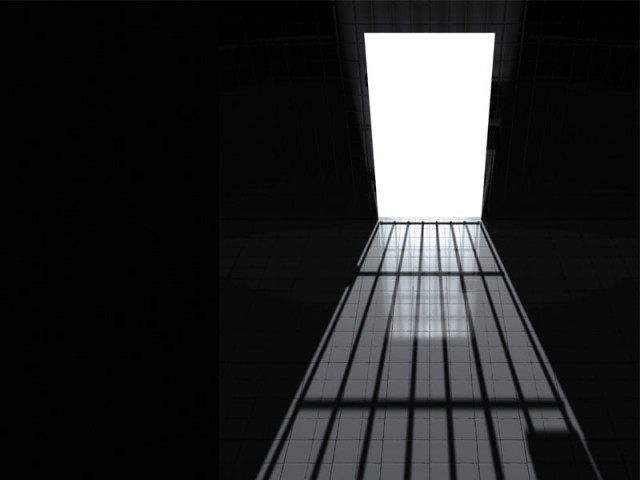Alternative to executions: Death penalty versus life imprisonment
Prosecutors argue death penalty acts as a deterrent; lawyers cite international precedents to show otherwise.

Alternative to executions: Death penalty versus life imprisonment
The black warrants were issued and ready. The men, Ataullah and Mohammad Azam, were set to be executed this July. But, as expected, stay orders were issued and the two – suspected Lashkar-e-Jhangvi activists convicted for sectarian attacks – were given new dates for their execution.
This is a familiar pattern in cases dealing with prisoners on death row in Pakistan. According to Amnesty International, 313 death sentences were given in 2011. None of those convicted were executed.
The alternative to the death penalty is life imprisonment, which is a maximum of 25 years. But prosecutors say that this usually ends up being commuted to around 10 or 12 years, because of remissions and appeals.
The moratorium has not stopped the judiciary from sentencing suspects to death. In 2011, the Anti-Terrorism Court (ATC) I sentenced a Rangers official to death for his role in the extrajudicial murder of Sarfraz Shah in a park in Karachi. The same court, however, has not sentenced anyone to death this year. According to Muzaffar Solangi, the prosecutor at the ATC-II in Karachi, the moratorium has no impact on their work. “Prosecutors pray for the maximum punishment,” he said. “Capital punishment is part of the law; there is no amendment or ordinance that has changed this.”
However, if there is any contradiction or irregularity in the evidence, the court does not award the maximum punishment, he noted. “These are mitigating circumstances. But this is for the court to decide, not us,” he said.
While prosecutors at the ATCs in Karachi did not offer alternatives to the penalty, Abdul Maroof, a prosecutor at ATC-III, said that it acts as a deterrent. “If the death sentence is finished from our system the family of the deceased will take law into their own hands,” he said.
Not a deterrent
Criminal lawyer Khwaja Naveed, however, says the death penalty has lost its value as a deterrent because it has been applied to a considerable number of offences. “In the British era, the punishment for murder was death. It was the only offence that carried capital punishment. However, we made so many special laws and applied death penalty to so many things, including blasphemy, kidnapping for ransom, narcotics and gang rape.”Despite this, Naveed says that courts in Pakistan were reluctant to award the death sentence, and even when they did, the state was in turn not willing to carry them out.“Now there is a pressure to convert the death sentences of convicts into life imprisonment,” he said.
Even though many offences carry the death sentence, the seasoned lawyer says this hasn’t deterred criminals. “The drug business didn’t stop for an hour. After [Zulfikar Ali] Bhutto put a ban on drinking alcohol in 1977, it has never happened that someone who wants alcohol can’t get it.”
Death penalty vs life imprisonment
Mustafa Qadri, the Pakistan researcher at Amnesty International, said in an e-mail interview that “Nowhere has it been shown that the death penalty has a special deterrent effect, making it a more effective deterrent than other punishments. The most comprehensive study carried out by the UN on the relation between the death penalty and homicide rates concluded that there is no proof that executions are a greater deterrent than life imprisonment. In fact, in countries where the death penalty has been abolished, crimes have often fallen. For example, 30 years after Canada abolished the death penalty for ordinary crimes the murder rate has fallen by over a third. In the USA, the average murder rate for states that use the death penalty is higher than for those that do not.”
Tough task
According to Naveed, one issue with murder only being punishable by a life sentence is the potential misuse. “A landowner can tell his servant to go commit a murder and say ‘You’ll only get sentenced to life and your family will get your salary.’”While lawyers feel that striking capital punishment would be extremely unpopular, reforming the law is a difficult task. It would require amending all laws and sections of the Pakistan Penal Code whose offences carry the ‘maximum punishment’ – i.e. death sentence. It would also be interpreted as being a violation of the Constitution which has to be in line with the Holy Quran and Sunnah, and would contravene the Qisas and Diyat law.
Middle path
Khwaja Naveed said that based on recent news reports about the death penalty, he sees the way forward as keeping the death sentence for murder and terrorism cases only and removing it for the other offences.
According to constitutional law expert Zain Shaikh, the ‘alternative’ to capital punishment would be a life sentence with no right to parole. “One could say that the person has to serve a certain number of years in the case of an incorrigible rapist, etc,” Shaikh said.Shaikh pointed to the moratorium once in place in the US as an example. “They did not say that the death penalty was unconstitutional, but that it was being applied in a discriminatory manner.” “Since coming into power this government has not executed anyone, and we welcome that,” Qadri said. “But we are concerned that by keeping the death penalty on the books and not formally abolishing the death penalty, the authorities are keeping open the option of restarting executions. At a time when Pakistan’s justice system is struggling to cope with the law and order situation, it can be all too easy for governments to see the death penalty as a quick fix solution. But the death penalty is not the answer to Pakistan’s problems.”
Published in The Express Tribune, November 12th, 2012.



1724319076-0/Untitled-design-(5)1724319076-0-208x130.webp)















COMMENTS
Comments are moderated and generally will be posted if they are on-topic and not abusive.
For more information, please see our Comments FAQ